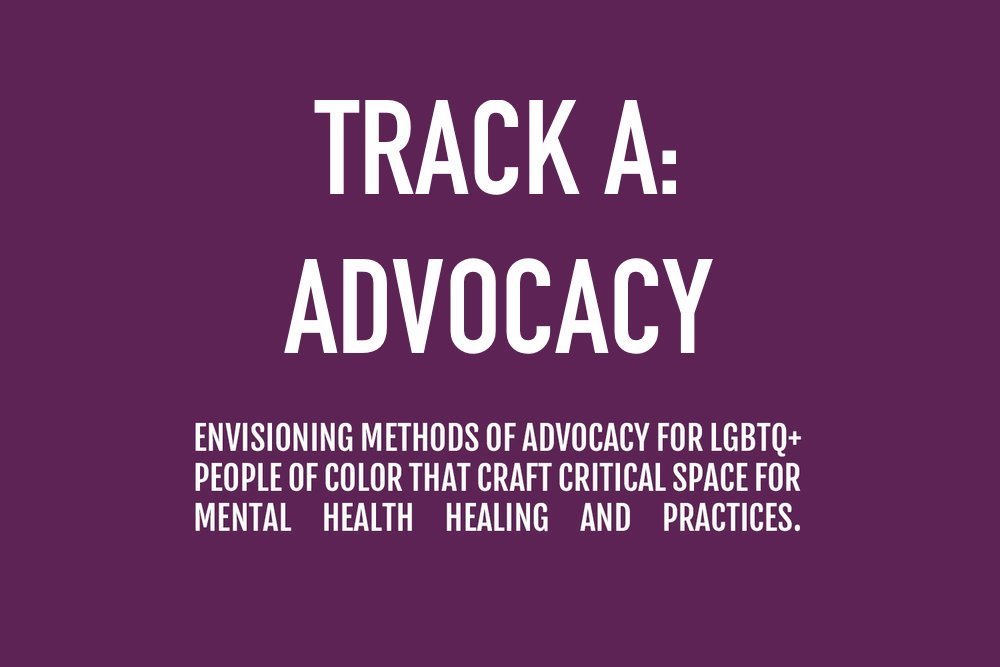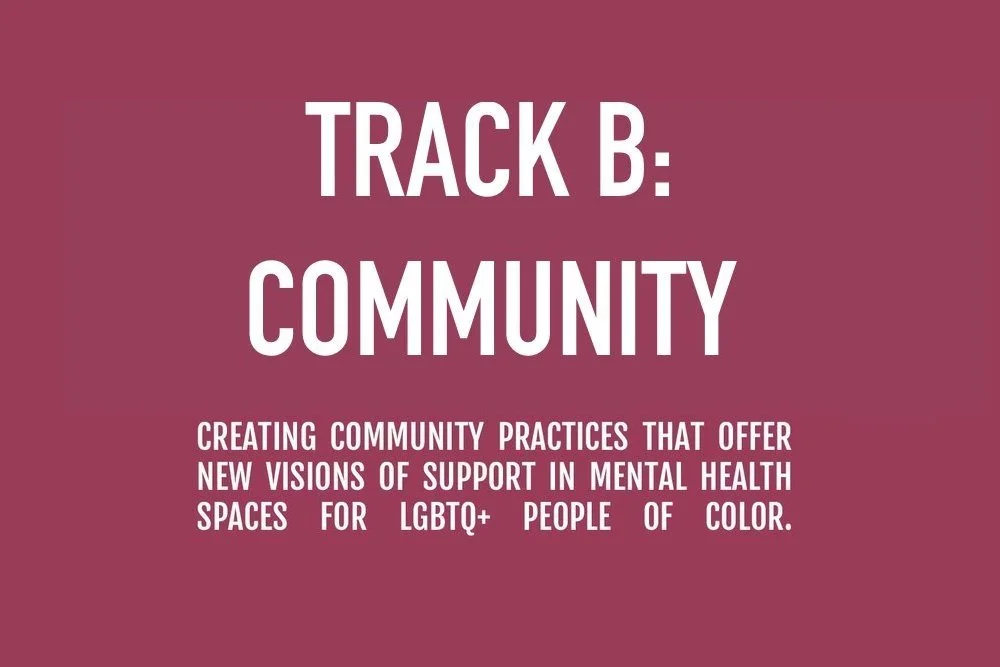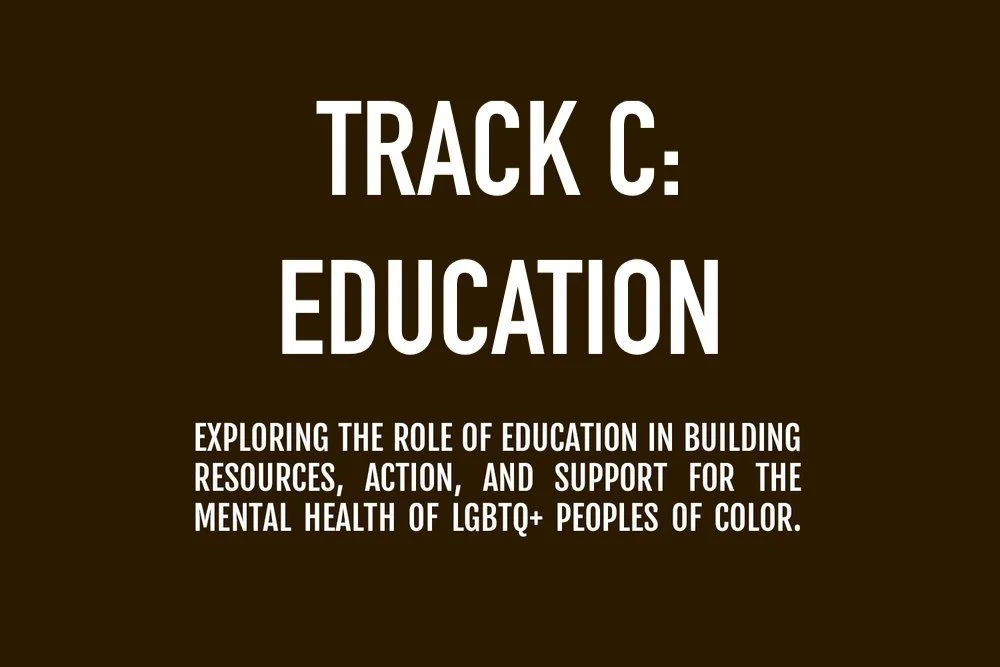About the Conference
The Conference’s planning team welcomes everyone and recognizes Same-Gender Loving (SGL) and Two-Spirit (2S) who are members of Black and Indigenous peoples of color communities. The Conference Program is divided into two distinct areas: Speakers (invited Speakers will address aspects of the conference Theme and Tracks) and Presenters (Workshops, Panel Discussions, and Stand-Alone Presentations conforming to the Conference Tracks). Abstract/proposal submitters are encouraged to complete the requirements for Continuing Education Units/Credits (CEUs) to ensure that LCSW, LMSW, LMHC attendees to their presentations receive credit toward their licenses. Here are the guidelines for abstract submissions; occasionally, an abstract submission may be selected to join our speaker roster. Carefully read these guidelines.
IMM25 Program:
IMM25 is for clinicians, academics, advocates, activists, community members with lived experience, and high school and college/graduate students.
The Conference will feature 45-minute Speaker presentations to establish common starting points, which will be followed by 75-minute concurrent single/stand-alone, small group presentations – some geared for clinicians and others for community members. On the Conference’s program, presentations will be marked by CE, indicating that the breakout presentation will provide Continuing Education Credits/Units (CEUs) for licensed professionals. Clinicians (LCSWs and LMSWs) requiring CEUs MUST attend a 75-minute presentation and complete the post-presentation requirements to receive the one-hour CEU for that presentation; a person could receive as many as three-contact/CEU hours.
Program: Abstract Submission and Tracks:
The Conference theme sets the tone for selected presentations from our abstract submission process, conforming to four tracks.
Track A – Advocacy
Track B – Community
Track C – Education, and
Track D – Research.
Click on each Track below to read the full description
Track A—Advocacy:
This track explores current and historical advocacy and activism at the core of LGBTQIA+ Black and people of color justice movements, with a focus on military service members, veterans, and their families. LGBTQ+ Black and people of color have been at the forefront of advocacy efforts, from Stonewall to ACT UP to Pride, mobilizing for visibility, equality, affirming spaces, and essential resources. Their contributions extend into military service, where they fought both on the battlefield and within institutions to secure equal rights, protections, and recognition.
Despite these efforts, many LGBTQ+ Black and people of color in the military continue to face social and psychological distress caused by ableism, racism, isolation, marginalization, homophobia, biphobia, and transphobia. These challenges are further compounded by policies affecting service members, veterans, and their families—ranging from access to affirming healthcare and mental health support, to addressing discrimination in enlistment, deployment, and post-service transition.
Using the Conference’s title: Building Resilience Through Unity; Facing Changing Battlefields Together we invite presenter(s) to highlight advocacy efforts supporting LGBTQIA+ Black and people of color within military and veteran communities, particularly those impacted by immigration status and service-related policies.
How have advocacy movements shaped military inclusion, benefits, and protections for these communities?
What work is being done at local and national levels to amplify the voices and experiences of LGBTQIA+ Black and people of color in the military?
What are the ongoing needs and opportunities to advance this advocacy, ensuring equitable access to resources, support networks, and career opportunities post-service?
How can service members and veterans actively engage in and expand advocacy efforts to transform outcomes for LGBTQIA+ Black and people of color within the military and beyond?
Track B—Community:
In keeping with the conference’s title: Building Resilience Through Unity; Facing Changing Battlefields Together, this track centers on the resilience, solidarity, and community-building efforts of LGBTQIA+ Black and peoples of color service members and veterans. Through personal narratives and lived experiences, presenters will explore how they have navigated military culture, challenged exclusionary policies, and fostered inclusive spaces in an institution historically resistant to change.
Presenters are invited to submit abstracts that highlight the ways they have built and sustained support networks, mentorship, and advocacy within the ranks. How have they created safe spaces for themselves and others? What strategies have they used to foster a sense of belonging in an environment that has not always welcomed them? How have they strengthened bonds among LGBTQIA+ Black and Peoples of Color service members while maintaining their commitment to service?
This track provides a platform for voices too often marginalized within military life—voices that are essential to shaping a more inclusive future. It is through storytelling that we aim to shed light on the ways LGBTQIA+ Black and Peoples of Color military personnel build community to thrive despite systemic challenges. Whether by forming peer mentorship programs, advocating for policy changes, or developing informal support systems, these service members found ways to uplift each other. These service members’ efforts are crucial to navigating the aftermath of “Don’t Ask, Don’t Tell”, accessing affirming healthcare, and pushing for equal treatment within a rigid command structure.
Additionally, this track will examine the intersectional experiences of LGBTQIA+ Black and Peoples of Color service members, who often face compounded barriers due to race, gender, and sexual orientation, and mental health shame, stigma and discrimination. In the context of ongoing societal shifts—such as the impact of COVID-19, the movement for racial justice, and rising anti-LGBTQIA+ rhetoric—how do these service members build solidarity and resilience? What challenges remain, and how can the military community better support them?
Track C—Education:
This track is designed to emphasize the importance of education, and awareness in fostering affirming and inclusive spaces for LGBTQIA+ Black and Peoples of Color veterans and military members. With the title, Building Resilience Through Unity; Facing Changing Battlefields Together, the Conference aims to increase knowledge, cultural awareness and sensitivity, and skills to improve societal support systems and equitable opportunities within and beyond military and veteran communities.
Submissions are encouraged to address the following:
- What current and effective models are being used to enhance cultural sensitivity, humility, and awareness in military and veteran spaces?
- How are inclusive and accessible environments being created for LGBTQIA+ military members and veterans from diverse cultural, ethnic, and experiential backgrounds?
- How do evolving training programs and policies impact the treatment, services, and overall equity for LGBTQIA+ Black and Peoples of Color veterans and military personnel?
- What educational strategies exist and or are mobilizing communities to advocate for LGBTQIA+ Black and Peoples of Color service members and veterans, fostering leadership, and encouraging emerging allies?
Presenters should explore how professionals are supporting LGBTQIA+ Black and Peoples of Color military members and veterans in navigating relationships, identity, and well-being throughout their service and post-service lives. This includes addressing challenges such as transitioning from military to civilian life, coping with deployment-related stressors, and managing discrimination within both military and veteran communities.
Additionally, how do these individuals cope with mental health struggles, substance use, housing insecurity, and other social determinants of health—especially when these needs are often overlooked? By addressing these questions, this track seeks to elevate discussions on systemic change, improve policies and practices, and empower LGBTQIA+ Black and Peoples of Color veterans and military members to thrive.
Track D—Research:
We are seeking recent or current research from both academics and professional practitioners that explores the experiences of LGBTQIA+ Black and Peoples of Color service members, with particular attention to their physical, mental, and overall well-being. Submissions should examine how military policies, culture, and institutional practices impact LGBTQIA+ Black and Peoples of Color personnel, including issues related to discrimination, harassment, and promotional/advancement barriers.
This track should explore mental health challenges such as PTSD, anxiety, and depression, as well as the effects of exclusionary policies, social isolation, and unit cohesion. In keeping with the conference’s title: Building Resilience Through Unity; Facing Changing Battlefields Together, research should contribute to both theoretical knowledge and best practices to improve LGBTQIA+ Black and Peoples of Color service members’ life experiences.
Submissions should address: How do military policies—both past and present—shape the inclusion and treatment of LGBTQIA+ Black and Peoples of Color individuals? What literature highlights the challenges faced by LGBTQIA+ Black and Peoples of Color service members, or migrants, and what strategies exist to address these challenges? What program evaluations and interventions have been effective in fostering a more inclusive military environment?
The research you present may examine personal resilience, institutional policies, and social dynamics within military settings. Submissions may include findings from master’s theses, dissertations, and other professional studies.
CLICK HERE TO SUBMIT ABSTRACTS
Submitted abstracts will be reviewed and selected by an independent panel, and a draft program will be made available in the first week of July, when early registration will commence; Speakers and Breakout Presenters receive complimentary registration. Selected Presenters are encouraged to obtain time off from work and make travel and accommodation arrangements to present at IMM25.




